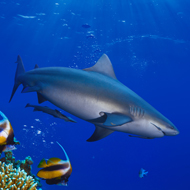
Scientists trial wetsuits amid measures to end shark cull
Stripey wetsuits designed to prevent shark attacks by making people look like poisonous sea snakes, are being trialled in Western Australia.
It follows a controversial cull of sharks, ordered by the government following five fatal attacks in the past two years. Western Australia is now recognised as the world's deadliest location for shark attacks.
Scientists at the University of Western Australia have been working with firm Dunbar Harper on one possible solution to reduce the attacks and save the sharks from further culls.
The ocean institute team based at the university, have already been studying shark vision for several years. They say sharks see in black and white and that by disrupting its visual perception an attack can either be prevented or at least delayed giving the chance for people to get out of the water.
The project has led to the creation of a new company Shark Mitigation Systems who are developing black and white banded wetsuits designed to make sharks see people as a potentially dangerous sea snake.
The black and white fabric has already been tested on barrels of dead fish to see if it deters sharks.
Although still in its early days, scientists at the university say the tests are encouraging and while not eliminating the risk of a shark attack, should go a long way to reducing it.
The patented designs are also being developed as stickers for surfboards, dive tanks, kayaks and other watersport products.



 The Veterinary Medicines Directorate (VMD) is inviting applications from veterinary students to attend a one-week extramural studies (EMS) placement in July 2026.
The Veterinary Medicines Directorate (VMD) is inviting applications from veterinary students to attend a one-week extramural studies (EMS) placement in July 2026.